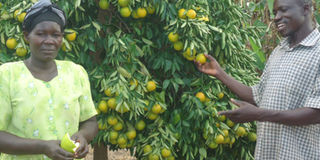‘I sold my commuter taxi to start an orange farm’

The Ogalos in the plantation. PHOTO BY SIMON PETER EMWAMU
What you need to know:
After six years of orange farming, Ogalo has built a permanent house of six bedrooms, a sitting room and a garage in Orupe, his home village. He also constructed a concrete underground tank that has a capacity of 125,000 litres of water.
Selling a vehicle to raise money for a venture in agriculture is hardly heard of. Instead, many people may move from farming to transport business. However, for Robert Ogalo, 49, owning a taxi was more of a liability than orange farming.
Standing in his six-and-a-half acre farm, which he started in 2007, Ogalo is happy with the decision he made.
It was decision that he says was initially met with great resistance from his wife and village mates, who valued the implied prestige attached to owning a vehicle and a great achievement in life.
Selling the car
Ogalo owned a commuter taxi, which he operated on the Serere-Ocapa-Soroti route. But he says he never realised any change in his livelihood as he has after taking up orange farming.
“I kept struggling for the entire three to four years until I heeded to the advice of an elderly man who was my customer,” he recalls about the advice to dispose of the taxi business and join orange farming because of its profitability.
“After selling the car, the atmosphere at home was tense, my wife and my children were unhappy,” he adds.
But Ogalo went on with his plans. He first planted two acres of oranges of the Hemline variety, which are often in demand in the Kenyan market that he was targeting.
Farming being an activity that requires a great deal of attention, he had to single-handedly attend to the farm as his family was initially opposed to the move.
“After 18 months when the first harvest trickled in, I earned Shs3m, a half of the Shs6m that I got from selling the vehicle,” he says. “It was then that my wife, Gorretti, and children started to help me out in the farm,” he narrates.
Determined to succeed, he ploughed back the money into the business by expanding his farm from two acres to four in 2009.
“The earnings from the harvest that same year tripled to Shs9m. In that short period of time, I had made the money I made from sale of the taxi,” Ogalo says.
Harvests
Annually, when the weather conditions are favourable, he takes home Shs20m to Shs30m from his farm, money he had never dreamt of having in a single year then when he owned a commuter taxi.
Ogalo adds that growing oranges seems tedious but it pays; all one needs to do is to ensure that he or she attends to his plantation every day, have traps for white flies, and carries out bi-weekly spraying to curb pests and diseases. In addition to that, he uses chicken droppings as fertilisers for his orange trees, which enable him to have two healthy harvests annually.
After six years of orange farming, Ogalo has built a permanent house of six bedrooms, a sitting room and a garage in Orupe, his home village. He also constructed a concrete underground tank that has a capacity of 125,000 litres of water.
Expand income
“Every drop of rain that lands on my roof is not wasted, it is collected underground. During the time of scarcity, it’s the water we use for domestic work and in the farm. There is a mechanised pump, which pumps the water to the tank on the roof,” he explains.
“My plan is to have a borehole drilled to back up the underground tank, so that I start drip irrigation.”
He also hires out the tractor that he bought to other farmers. “All in all, I have come to learn that in every struggle faith is victory,” he says.
His wife remarks that had her husband not persisted with his decision, it would be difficult for them to expand their income and make various investments.
“With earnings from oranges, we have managed to open a shop for electronics and perhaps one day, we can replace the car, if need be,” she says.




